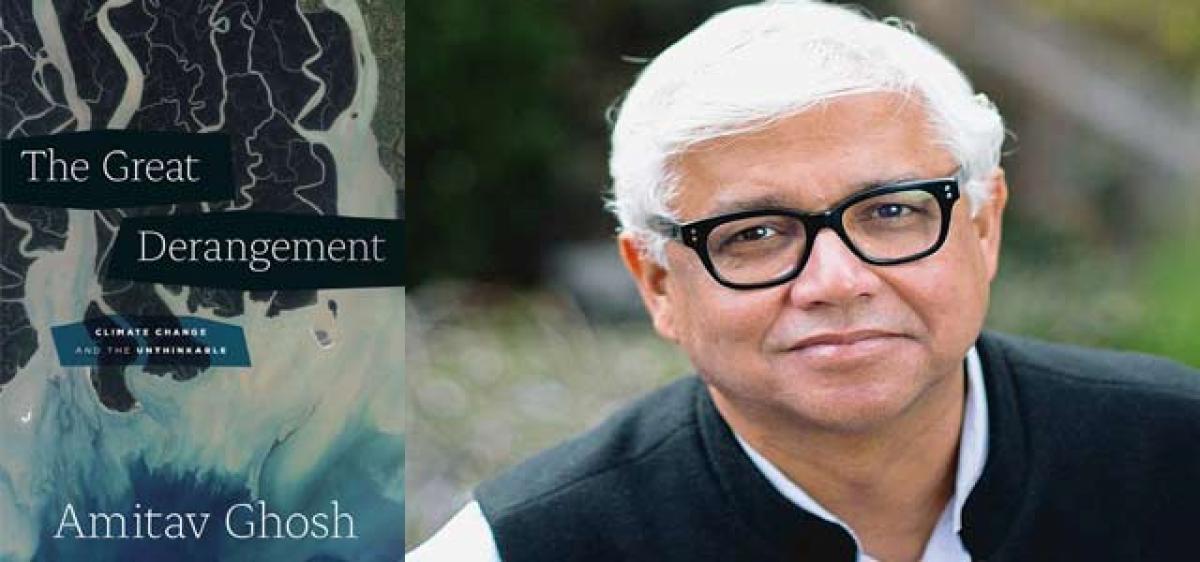The Great Derangement

Amitav Ghosh, the maverick fiction writer with some extremely successful titles to speak of that include ‘Calcutta Chromosome’, ‘The Glass Palace’, ‘Ibis Trilogy’, ‘The Hungry Tide’, mostly set against historical background traversing the oceans of the East – especially the Indian Ocean- has always referred to nature in an unconsciously conscious way.
Amitav Ghosh, the maverick fiction writer with some extremely successful titles to speak of that include ‘Calcutta Chromosome’, ‘The Glass Palace’, ‘Ibis Trilogy’, ‘The Hungry Tide’, mostly set against historical background traversing the oceans of the East – especially the Indian Ocean- has always referred to nature in an unconsciously conscious way.
Be it the beautiful Sunderbans, the fury of floods, the forests, mining, it was through his books that we learnt of the trade links across Indian Ocean that were invariably dependent on natural resources.
Amitav Ghosh’s latest work of non-fiction ‘The Great Derangement: Climate Change and the Unthinkable’ questions the detachment of contemporary fiction with the imminent danger of climate change that is creating havoc across the world
His latest work of nonfiction ‘The Great Derangement: Climate Change and the Unthinkable’ that was published by University of Chicago Press questions the detachment of contemporary fiction with the imminent danger of climate change, creating havoc across the world, around us.
And whenever such a subject is dealt with, we immediately slot the books into other genres like Science Fiction, he has opined at various forums in recent times.
The book, that he also delivered as lectures and essays, in parts ‘examines our inability—at the level of literature, history, and politics—to grasp the scale and violence of climate change.’
Why is it so important now? While maintaining that it is not so easy to incorporate natural phenomenon into a narrative of fiction; with so much happening around us, and the grave danger that climate change poses, it has attained so much more urgency, he says.
Speaking on the sidelines of the Tata Literature Festival, Amitav Ghosh explains the reason behind writing ‘The Great Derangement’.
“The impact of climate change is multiplying all around us and calamities like drought, extreme rainfall are bringing the impact of climate change to our doorstep.
We are all one way or the other related to climate change and we need to respond to this. Despite the urgency I see no reference to it in literature, especially fiction.”
He adds, “Once you become aware of what’s happening around, you cannot really keep it out of your conscience. Now, I am more attentive. I will never be able to write anything, which is not aware of what is happening in our world.”
Referring to the climate impact on the beautiful Sunderbans that he had described in ‘The Hungry Tide’, he reveals, “My uncle was an estate manager, and I used to stay in Sunderbans for a long time.
And my description comes from personal experience. It is today, one of the best examples of climate change impact.
With increasing sea level, salt water is coming further and further in, and islands are disappearing. Until 2012 farmers would grow rice etc, but after the devastating cyclone Aila, the salt water has rendered a lot of land useless for agriculture, and there is a massive exodus of farming community who are now working as labourers.”
Recently, his comments on the famous Paris Environment deal also made a lot of news on social media.
Evidently he was not impressed with the deal. And now with US president Donald Trump, who thinks threat to environment is a Chinese Hoax, will it impact the international agreement. “I do not think so,” says Amitav.
“I think there is a lot that is not right with the environment policy and it will not go very far. At the same time it is better than nothing and it is a great initiative to get so many nations together,” he says, “It is primarily the greatest success from the developed nations point of view.
They have got what they wanted. Now that he is in power, Donald Trump will realise that it is an American-sponsored agreement, which is basically to his advantage.”
Amitav Ghosh is currently revisiting the spice trail, and has been in Indonesia for the same. Any book on the cards? “Definitely not, any time soon. I am mostly writing articles,” he shares.














